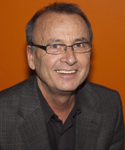We had the pleasure of interviewing Dr. Irwin DeVries, Thompson River University, about his experiences at the OE Global 2015 conference. The conference setting at Banff Park Lodge in beautiful Banff, AB was inspiring in itself but DeVries came away inspired by the international community’s passion – its heart and vision, for open education.

Over 300 attendees from around the globe met to learn about the many facets of the open education movement including policy, research, strategy and innovation. A broad spectrum of representatives of the Open Education community attended, including universities, a variety of agencies, governments and non-profits. Representatives travelled from all around the world to attend and participate. Said DeVries, “The diversity of participants, their backgrounds and their location is incredible.”
What was your overall impression of the conference?
It struck me more than ever before that there is a steadily growing international community with the interest and ability to promote and implement open educational resources and practices. My imagination was captured by the momentum and by how it bodes well for the future of open education. There is a strong desire among participants worldwide to collaborate and learn with and from each other.
What did you take away?
Open education is not a minor sideshow any more, but a necessary and vital part of how we share, collaborate and learn. We need to advocate more for openness at many levels. We need to own the movement and collaborate. There is still a lack of awareness and understanding in our institutions that we need to keep working on.
There is an abundance of open content but the challenge is in finding tools to transform and edit what’s there, and repurpose it for different contexts. There is increasing awareness that we must move past open content in itself, and develop better tools and practices that make it simple for more educators to participate in open education. We’re still in the early stages when it comes to these things.
We continue to need activities taking place on a wider system level such as the BC Open Textbook project, alongside smaller scale work and action projects among independent educators and institutions. We need to find ways to sustain open education, and find ways to make it an attractive and obvious improvement over traditional ways of doing things. Open textbooks are a perfect example of this, where we save students money while also giving faculty more flexibility with their learning resources.
What valuable contacts did you make?
First of all it was great to encounter many familiar faces, part of a worldwide network involved in open education and learning from one another. Beyond that, I made some great new contacts from the global community that were very inspiring and I intend to follow up with them. This was part of a project with Dr. Valerie Irvine from the University of Victoria and her team, where we’re conducting and curating video recorded interviews with long time open educators and hearing their stories.
Some of the people I interviewed included Professor Tian Belawati President of the Open University Indonesia, Dr. Patricia Arinto, Associate Professor, Open University of the Philippines and Vice Chancellor Vincent Tenebe from the National Open University of Nigeria, along with many others. They all had amazing stories to tell of how open and distance education is being used in their countries to address learning needs that cannot be met using traditional methods and approaches.
What do you intend to follow up on?
I want to continue hands-on with implementing and researching open educational practices in my own university. Thompson River University (TRU) is a founding anchor partner of the Open Educational Resource Universitas We have developed two open courses one of which includes an open textbook. This work is done in an open wiki environment collaboratively with a number of other higher education institutions and volunteers. We plan to continue encouraging the ongoing adoption of open textbooks and on learning more about how they are implemented and maintained in the longer term.
I’d also like to see an increase in the implementation of open educational resources and open practices as part of our regular work and routines, rather than a special or “one-off” initiative. It’s also important to study, document and share the knowledge we gain with others trying to do the same things. A big part of being “open” is doing the work once, then sharing it with many. And a key element in education is when you see faculty getting fired up about open education. Then things really start to move.
I’ve worked since the early 80’s in the open education movement. This conference gave me the enjoyment of watching growth and transformation and the reawakening of some of the fundamentals of why we are really involved in Open Education.
Notable Quotes
“OEGlobal 2015 was an outstanding conference reflecting the international growth and maturation of the movement. It was refreshing to see a growing number of OERu contributions and papers at the conference as the implementation of our innovation partnership gains momentum.” Wayne Mackintosh May 2015
“A big part of being “open” is doing the work once, then sharing it with many. And a key element in education is when you see faculty getting fired up about open education. Then things really start to move.” Dr. Irwin DeVries May 2015
